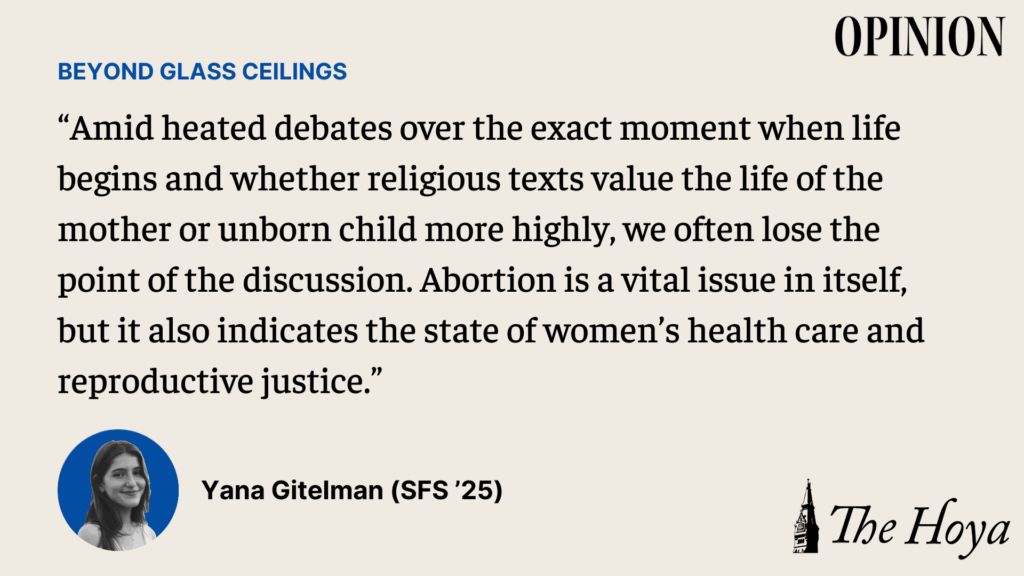CW: This article references sexual assault. Please refer to the end of the article for on- and off-campus resources.
On Oct. 2, over 5,000 protesters gathered in downtown Washington, D.C., at the fifth Women’s March to advocate for abortion rights. At the same time, many of us Georgetown University students gathered on the Village A rooftops for homecoming. I spent much of that night reflecting on the choice I made to stay on campus that day and on Georgetown’s relationship with reproductive justice.
I have had countless discussions with boys and men who treat abortion as the butt of a dark joke or as a thought experiment for lunchtime debates, removed from their sphere of personal experience or worry.
The truth is there are real and ongoing threats to abortion rights. The Texas Legislature’s new set of restrictions have brought the issue to the fore of national discussion once again. Texas Senate Bill 8, passed this May, effectively bans abortions after six weeks and includes a provision that empowers citizens to act as bounty hunters: Texans can now sue anyone complicit in illegal abortions for over $10,000.
Amid heated debates over the exact moment when life begins and whether religious texts value the life of the mother or unborn child more highly, we often lose the point of the discussion. Abortion is a vital issue in itself, but it also indicates the state of women’s health care and reproductive justice. Abortion is fundamentally an issue of access and of misogyny: the most polarizing, sensationalized aspect of a much broader set of human rights issues.
No one I’ve ever met is an advocate for abortion itself. The decision to have an abortion and the procedure itself are generally traumatic enough without any government-sanctioned punishments. Whatever our reasons may be, most of us want to live in a world where fewer people have to make the difficult decision to have an abortion. We just have different priorities in approaching the issue; some of us look to the prevention of unwanted pregnancies, while others look to the punishment of those who have already become pregnant.
The path toward decreasing the need for abortion is clear, but anti-abortion activists often choose to place blame onto women seeking abortion instead of the societal factors that drive them to seek this type of care. We know comprehensive sex education and access to contraception lower teen pregnancy rates and thus abortion rates significantly, so it is worth wondering why the abortion debate so often skips over prevention. Like in so many other issues, we choose to pass onto women — in their most difficult and desperate moments, no less — the burden of easing others’ discomfort. In our collective perception of sexual assault, women must be the gatekeepers of sex; women must avoid facing violence rather than hold men accountable for enacting it. In health care and in law alike, women must avoid needing support. Once a woman requires support, it is her fault for having failed to avoid the situation to begin with.
Additionally, the rhetoric employed of anti-abortion advocates assumes that women are responsible for carrying a pregnancy to term at any cost. If we cared purely about life, we would be enraged by the deaths of hundreds of thousands of women each year during pregnancy or childbirth, or by the 7 million women per year who are admitted to hospitals after having unsafe abortions. But these tragedies do not come up in “pro-life” arguments. Women bear the responsibility of carrying our children to term and raising them, but we do not deserve assistance in the form of social services. The quality of our children’s lives, let alone our own lives, does not factor into most “pro-life” arguments.
Those people — citizens and lawmakers — whose abortion policies hinge on controlling rather than providing for women reveal their priorities in those politics. Those who project irresponsibility or immorality onto women who seek abortions without considering context are guided by misogyny rather than compassion.
At Georgetown, you’ll be hard pressed to find someone who does not claim to want to change the world. We attend a school full of future policy writers, politicians, journalists and medical professionals, all brimming with ambition. As global citizens, in whatever profession each of us decides to pursue, we must take women’s health care seriously.
Yana Gitelman is a first-year in the School of Foreign Service. Beyond Glass Ceilings is published every other week.
Resources: On-campus resources include Health Education Services (202-687-8949) and Counseling and Psychiatric Service (202-687-6985)); additional off-campus resources include the D.C. Rape Crisis Center (202-333-7273) and the D.C. Forensic Nurse Examiner Washington Hospital Center (844-443-5732). If you or anyone you know would like to receive a sexual assault forensic examination or other medical care — including emergency contraception — call the Network for Victim Recovery of D.C. (202-742-1727). To report sexual misconduct, you can contact Georgetown’s Title IX coordinator (202-687-9183) or file an online report here. Emergency contraception is available at the CVS located at 1403 Wisconsin Ave NW and through H*yas for Choice. For more information, visit sexualassault.georgetown.edu.














